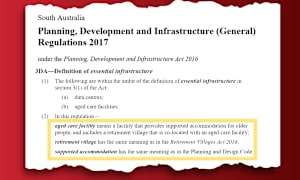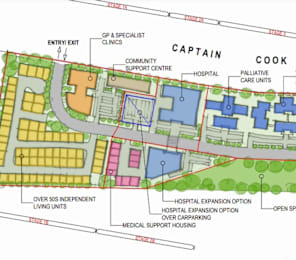Four members of the committee leading the development of the 8 Point Plan gave a rundown on where each point is at.
They were:
- Alison Quinn, President, Retirement Living Council and Chief Executive, RetireAustralia
- Stephen Bull, CEO Retirement Living, Stockland
- Nicholas Playoust, Managing Director, AEH Retirement Living
- Rosemary Southgate, Principal, Russell Kennedy Lawyers
Point One: nationally consistent legislation and plain English contracts
Last year the RLC released a standardised contract. Now an assessment of the legislation is being made around the country plus residents are being engaged, with the plan to provide a new contract to the Federal Minister.
Point Two: Improve industry accreditation standards and make mandatory
The Property Council owns the Lifemark accreditation program and brand, which is administered by BSI. Launched in 2013 it comprises 26 standards across six categories. The large operators have taken it up but the small operators have not.
The objectives are “to achieve wide acceptance, for it to be relevant to residents as well and for residents to value it”. And to make it mandatory for all villages.
The committee is reviewing it “into 2018”.
Who will pay for accreditation – operators or residents? It will vary, including shared costs. A tiered approach to pricing is likely to support small operators.
Point Three: Improve training and professional support of village managers and sales staff
The Property Council Academy Village Manager courses are being reviewed. The objective is to achieve a qualification that is recognised.
The impact of some staff/resident interaction “is the source of most criticism…the effect is profound to put good people into a village”.
Better training is regarded as vital.
Point Four: Encourage potential residents to seek independent legal and financial advice
It is apparent residents are not getting legal advice and solicitors do not understand village contracts.
The Code of Conduct will encourage residents to get professional advice. The Law Society in each state is being approached to promote a lawyer accreditation in village contracts and the RLC has facilitated a release of standard documents for new residents to sign acknowledging they have decided not to get legal advice.
Point Five: Support a quick, cost effective independent dispute resolution process like an Ombudsman
The Government is telling the sector it needs to do more “to make lives easier for residents”.
“Our residents want to be heard – easy, transparent”.
At the moment the data does not exist to understand the prevalence of disputes. The committee will be working through the issues “in the first quarter of 2018”.
Point Six: Ensure transparent pricing of accommodation and services
Not discussed by the panel. Related to the contracts (Point One).
Point Seven: Maintain and strengthen relationships with the resident associations
“We need our residents and families valuing the Code of Conduct. They are 200,000 forgotten voices”.
“The ABC/Fairfax coverage damaged residents’ assets too”.
Resident representatives participated in the July workshop, are being consulted in the development of the Code of Conduct.
There is an open channel and four resident representatives were present at the conference.
Point Eight: Develop the Code of Conduct
The (fourth) draft will be released next week for feedback.
The ACCC is being checked to ensure it complies with their guidelines.
It should be launched in early 2018 and ‘ultimately it will be mandatory”.
A public register of who has committed (or not) to the Code of Conduct is being considered. If there are complaints the sector will “work with them”.










